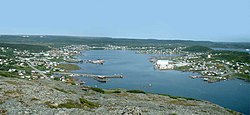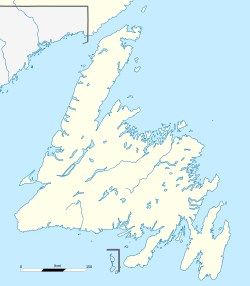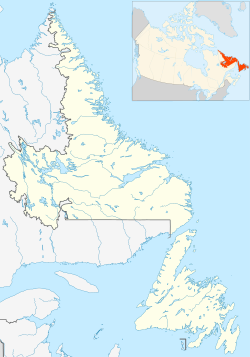St. Anthony, Newfoundland and Labrador
St. Anthony is a town on the northern reaches of the Great Northern Peninsula of the Canadian province of Newfoundland and Labrador. St. Anthony serves as a main service centre for northern Newfoundland and southern Labrador. St. Anthony had a population of 2,180 in 2021, compared with 2,258 in 2016,[2] 2,418 in 2011, 2,476 in 2006 and 2,730 in 2001.
St. Anthony | |
|---|---|
Town | |
 | |
Location of St. Anthony in Newfoundland | |
| Coordinates: 51°22′30″N 55°36′59″W / 51.37500°N 55.61639°W | |
| Country | Canada |
| Province | Newfoundland and Labrador |
| Settled | early 16th century |
| Government | |
| • Type | Town Council |
| • Mayor | Brad Johannessen |
| Area | |
| • Land | 37.02 km2 (14.29 sq mi) |
| Population (2021) | |
| • Town | 2,180 |
| • Density | 61.0/km2 (158/sq mi) |
| • Urban | 1,986 |
| Time zone | UTC−03:30 (NST) |
| • Summer (DST) | UTC−02:30 (NDT) |
| Area code | 709 |
| Highways | |
| Website | www.stanthony.ca |
L'Anse aux Meadows, which was designated a National Historic Site of Canada in 1968 and a World Heritage Site by UNESCO in 1978, is located 40 km from St. Anthony.[3] St. Anthony is the largest population centre on the Great Northern Peninsula.
History
editThe history of European settlement of St. Anthony reaches back to the early 16th century, when French and Basque fishermen used the well-sheltered harbour as a seasonal fishing station. By the time explorer Jacques Cartier came across the settlement in 1534, he reported it was named St. Anthony Haven.
More people began arriving in the mid-19th century. By 1857, a census found 71 inhabitants in 10 families. By 1874, the population rose to 110, and by 1891, it was 139.
The town grew in population after the arrival of Dr. Wilfred Grenfell in 1900 (see below).
A salt fish plant and cold storage facility built in the 1930s and 1940s were a boon to the local economy.
St. Anthony also became an outpost for the U.S. military. In 1951, a Pinetree Line radar site was built on a nearby hill, and by 1962, there were 250 servicemen stationed there. The site was operated by the 921st AC&W Squadron.
Tourism has become an important industry to the town as fishing stocks dwindled. Tourists come to visit historical sites related to Grenfell, to see the nearby Viking settlement at L'Anse aux Meadows or to see natural attractions such as icebergs and whales.
Dr. Wilfred Grenfell
editSt. Anthony's most influential historic figure is Dr. Wilfred Grenfell.[4]
Born on February 28, 1865, in northern England, Grenfell entered the London Hospital Medical School in 1883. While in London, Grenfell heard the American evangelist Dwight L. Moody. The event inspired him to a life of Christian charity.
A member of the Royal National Mission To Deep Sea Fishermen, Grenfell was sent to investigate the conditions of fishermen in the Labrador region in 1892.[5][6] He was said to be the first doctor to reach the region. He would later establish a string of hospitals, cooperatives and schools for people in remote Newfoundland and Labrador towns.[7] He chose Red Bay as the headquarters of the Grenfell Mission in 1900. However, in later years the focus of the organization became St. Anthony. He began responsibility of health care for the more than thirty thousand residents in Northern Newfoundland and Southern Labrador. This health responsibility was maintained until 1981 when the Government bought the resources and took over responsibility for the health service for one dollar. Dr. Grenfell was most interested in the holistic approach to betterment of the lifestyle of the people of the province. He worked in areas of food production, craft production and sale. Grenfell also worked to provide funds for his religious mission through speaking tours throughout the United States and Europe and he used colorized slides of the people and places he was operating his mission. He began to work from a non denominational Christian belief structure and religious conversion was his goal. Although the religious based mission was successful he was supported by volunteers who gave service to the mission. One notable volunteer was Josephine Colgate of the Colgate fortune.
Grenfell died in 1940 and his ashes were interred at Tea House Hill in St. Anthony with those of his wife Lady Anne Grenfell. Dr. Grenfell's contributions to the region are honoured by Grenfell Historic Properties, which comprises the Grenfell Interpretation Centre, the Grenfell House Museum, and the Grenfell Handicrafts Store.[8]
Demographics
editIn the 2021 Census of Population conducted by Statistics Canada, St. Anthony had a population of 2,180 living in 924 of its 1,036 total private dwellings, a change of -3.5% from its 2016 population of 2,258. With a land area of 37.46 km2 (14.46 sq mi), it had a population density of 58.2/km2 (150.7/sq mi) in 2021.[9]
| Year | Pop. | ±% |
|---|---|---|
| 1951 | 1,380 | — |
| 1956 | 1,761 | +27.6% |
| 1961 | 1,820 | +3.4% |
| 1966 | 2,269 | +24.7% |
| 1971 | 2,593 | +14.3% |
| 1976 | 2,987 | +15.2% |
| 1981 | 3,107 | +4.0% |
| 1986 | 3,180 | +2.3% |
| 1991 | 3,164 | −0.5% |
| 1996 | 2,996 | −5.3% |
| 2001 | 2,730 | −8.9% |
| 2006 | 2,476 | −9.3% |
| 2011 | 2,418 | −2.3% |
| 2016 | 2,258 | −6.6% |
| 2021 | 2,180 | −3.5% |
| [2] | ||
Climate
editSt. Anthony experiences a subarctic climate (Köppen climate classification Dfc) with long, cold winters and short, mild summers. However, owing to the strong maritime influence, the winters are milder than most of Canada at the same latitude, and there is no permafrost especially with snow cover sometimes reaching as high as 276 centimetres (108.7 in). However its winters are still far more severe than Valentia Island off the coast of Ireland half a degree of latitude farther north on the other side of the Atlantic which enjoys the moderating effects of the Gulf Stream. St. Anthony is as much as 11.4 °C (20.5 °F) colder than London on a near exact latitude in an average year. Precipitation, driven by the powerful Icelandic Low, is quite high year round, with an annual average of approximately 1,300 millimetres (51.2 in).
| Climate data for St. Anthony (1981-2010) | |||||||||||||
|---|---|---|---|---|---|---|---|---|---|---|---|---|---|
| Month | Jan | Feb | Mar | Apr | May | Jun | Jul | Aug | Sep | Oct | Nov | Dec | Year |
| Record high humidex | 5.7 | 4.1 | 8.6 | 10.6 | 23.0 | 30.6 | 36.6 | 34.5 | 28.5 | 21.0 | 14.4 | 7.3 | 36.6 |
| Record high °C (°F) | 6.0 (42.8) |
6.7 (44.1) |
9.4 (48.9) |
14.1 (57.4) |
22.8 (73.0) |
27.4 (81.3) |
28.2 (82.8) |
30.0 (86.0) |
24.3 (75.7) |
20.0 (68.0) |
13.2 (55.8) |
8.3 (46.9) |
30.0 (86.0) |
| Mean daily maximum °C (°F) | −7.5 (18.5) |
−8.0 (17.6) |
−3.7 (25.3) |
1.1 (34.0) |
6.4 (43.5) |
11.6 (52.9) |
16.5 (61.7) |
16.8 (62.2) |
12.7 (54.9) |
6.5 (43.7) |
1.0 (33.8) |
−3.8 (25.2) |
4.1 (39.4) |
| Daily mean °C (°F) | −11.8 (10.8) |
−12.1 (10.2) |
−7.4 (18.7) |
−1.9 (28.6) |
2.8 (37.0) |
7.1 (44.8) |
12.0 (53.6) |
12.6 (54.7) |
8.8 (47.8) |
3.5 (38.3) |
−1.9 (28.6) |
−7.5 (18.5) |
0.3 (32.5) |
| Mean daily minimum °C (°F) | −16.1 (3.0) |
−16.2 (2.8) |
−11.1 (12.0) |
−4.9 (23.2) |
−0.8 (30.6) |
2.7 (36.9) |
7.4 (45.3) |
8.4 (47.1) |
4.9 (40.8) |
0.4 (32.7) |
−4.8 (23.4) |
−11.3 (11.7) |
−3.5 (25.7) |
| Record low °C (°F) | −32.8 (−27.0) |
−31.7 (−25.1) |
−31.6 (−24.9) |
−22.5 (−8.5) |
−11.7 (10.9) |
−3.1 (26.4) |
−2.0 (28.4) |
−0.3 (31.5) |
−2.5 (27.5) |
−10.7 (12.7) |
−17.5 (0.5) |
−30.6 (−23.1) |
−32.8 (−27.0) |
| Record low wind chill | −51.1 | −50.0 | −48.5 | −35.7 | −23.3 | −11.3 | −4.4 | 0.0 | −8.7 | −22.2 | −28.7 | −47.8 | −51.1 |
| Average precipitation mm (inches) | 113.9 (4.48) |
94.6 (3.72) |
98.0 (3.86) |
81.9 (3.22) |
82.7 (3.26) |
123.5 (4.86) |
106.3 (4.19) |
107.6 (4.24) |
119.8 (4.72) |
125.3 (4.93) |
115.7 (4.56) |
138.1 (5.44) |
1,307.3 (51.47) |
| Average rainfall mm (inches) | 7.6 (0.30) |
5.5 (0.22) |
17.8 (0.70) |
34.1 (1.34) |
64.4 (2.54) |
119.2 (4.69) |
106.3 (4.19) |
107.6 (4.24) |
119.6 (4.71) |
111.8 (4.40) |
65.3 (2.57) |
29.2 (1.15) |
788.3 (31.04) |
| Average snowfall cm (inches) | 115.1 (45.3) |
94.8 (37.3) |
84.3 (33.2) |
49.1 (19.3) |
18.9 (7.4) |
4.6 (1.8) |
0.0 (0.0) |
0.0 (0.0) |
0.2 (0.1) |
14.1 (5.6) |
51.4 (20.2) |
111.3 (43.8) |
543.7 (214.1) |
| Average precipitation days (≥ 0.2 mm) | 19.4 | 16.6 | 17.5 | 15.7 | 15.6 | 16.9 | 17.2 | 15.3 | 15.4 | 17.7 | 17.9 | 21.2 | 206.5 |
| Average rainy days (≥ 0.2 mm) | 2.2 | 2.1 | 4.7 | 8.0 | 11.8 | 16.5 | 17.2 | 15.3 | 15.4 | 15.6 | 9.2 | 4.9 | 122.9 |
| Average snowy days (≥ 0.2 cm) | 18.8 | 15.7 | 14.9 | 10.3 | 5.5 | 1.4 | 0.0 | 0.0 | 0.2 | 4.5 | 11.9 | 19.7 | 102.7 |
| Source: [10] | |||||||||||||
Transportation
editThe town is at the end of the Great Northern Peninsula Highway.[11] It is also served by St. Anthony Airport.
Attractions
edit- Is a popular tourist destination known for its whale watching.
Dr. Wilfred Grenfell's work in St. Anthony is commemorated by several historic sites and museums, including:[8]
- Grenfell House Museum: Built between 1909 and 1910, it was the home of Dr. Grenfell, his wife Anne, and their three children. After Grenfell's retirement to Vermont, the house became a residence for mission workers. It opened as a museum in 1981.
- Grenfell Interpretation Centre: Interprets the life and times of Dr. Wilfred Grenfell through a gallery of interpretative paneling and displays. The centre is designed to be self touring and to provide a more modern interpretative experience for visitors.
- Tea House Hill: A 20-minute walking trail with interpretative panels and seating along the route. The trail leads to the top of the hill where Dr. Grenfell, his wife and other colleagues' ashes are buried.
Other attractions include:
- The Rotunda: A display of ceramic murals depicting the culture and history of the people of Newfoundland and Labrador. The mural was created by the acclaimed sculptor Jordi Bonet.[12]
- Dockhouse Museum: which currently is not in operation, Demonstrated to visitors how vessels of all sizes were pulled out of the water for repairs in the late 1920s.
- L'Anse aux Meadows: A Norse village briefly inhabited around 1000 AD.[13][14] The site was recognized as one of the world's major archaeological properties and is designated a UNESCO World Heritage Site in 1978.[15]
- St. Mein Bay
Notable people
edit- Krista Howell, MHA and former mayor[16]
- Gavin Tucker, Mixed Martial Arts fighter
- Shirley Jane Turner, convicted murderer
In popular culture
editSt. Anthony appears as a playable area in the 2014 videogame Assassin's Creed Rogue.
See also
editReferences
edit- ^ "Town of St. Anthony - Official Website". Town of St. Anthony. Retrieved November 9, 2020.
- ^ a b c "Census Profile, 2016 Census: St. Anthony, Town [Census subdivision], Newfoundland and Labrador". Statistics Canada. 8 February 2017. Retrieved October 13, 2019.
- ^ "L'Anse aux Meadows National Historic Site". UNESCO World Heritage Center.
L'Anse aux Meadows is the first and only known site established by Vikings in North America and the earliest evidence of European settlement in the New World. As such, it is a unique milestone in the history of human migration and discovery.
- ^ "Wilfred Grenfell Of Labrador Dead. Founder in 1892 of Medical Mission Known Throughout World Stricken in Vermont". New York Times. 10 October 1940. Retrieved 2014-01-17.
Sir Wilfred Thomason Grenfell, founder of the Labrador Medical Mission, who devoted his life to caring for the spiritual and physical needs of Eskimos, Indians and fishermen of ...
- ^ "Wilfred Thomason Grenfell (1865 - 1940)". Grenfell Family History Site. Retrieved 26 November 2010.
- ^ "Labrador: The Inuit Experience". The Arctic Coastal Zone Management Newsletter. 9. Barrow, Alaska: North Slope Burough. February 1978. Retrieved 19 August 2016.
- ^ Blair, Louisa (15 December 1991). "Dr. Wilfred Grenfell and the forgotten people of Newfoundland and Labrador". Canadian Medical Association Journal. 145 (12). Ottawa, Ontario, Canada: Canadian Medical Association: 1633–1635. ISSN 0820-3946. PMC 1336097. PMID 1742705.
- ^ a b "Grenfell Historic Properties". www.grenfell-properties.com. Retrieved 2021-03-27.
- ^ "Population and dwelling counts: Canada, provinces and territories, census divisions and census subdivisions (municipalities), Newfoundland and Labrador". Statistics Canada. February 9, 2022. Retrieved March 15, 2022.
- ^ "Canadian Climate Normals 1981–2010" (CSV). Environment Canada. Retrieved 2016-05-09.
- ^ "Route 430 in Newfoundland and Labrador" (Map). Google Maps. June 21, 2019.
- ^ Properties, Grenfell. "The Jordi Bonet Murals". Province of Newfoundland and Labrador. Retrieved 22 June 2011.
- ^ "History – Discovery of the Site and Initial Excavations (1960–1968)". L'Anse aux Meadows National Historic Site of Canada. Parks Canada. 4 April 2019.
- ^ Bird, Lindsay (30 May 2018). "Archeological quest for Codroy Valley Vikings comes up short – Report filed with province states no Norse activity found at dig site". Canadian Broadcasting Corporation. Retrieved 19 June 2018.
- ^ Wallace, Birgitta (2003). "The Norse in Newfoundland: L'Anse aux Meadows and Vinland". Newfoundland and Labrador Studies. 19 (1).
- ^ Dooley, Danette. "Meet the first female mayor of St. Anthony: Howell dedicated to making a difference in her community | The Telegram". www.thetelegram.com. Retrieved 2021-03-28.



